Services inflation rages, but the durable-goods PCE price index had biggest month-to-month drop in years: yardstick for the Fed’s inflation target.
By Wolf Richter for WOLF STREET.
The Core PCE price index, the yardstick the Fed uses for its inflation target, was released today by the Bureau of Economic Analysis. It excludes the always volatile food and energy products to present a picture of underlying inflation. Many goods prices have declined on a month-to-month basis as inflation has shifted from goods to services.
And Powell has been hammering on the services segments within the PCE price index, where inflation has risen and persisted. About two-thirds of the money that consumers spend goes into services – so the services PCE is the biggie. And inflation is much harder to uproot from services, as Powell pointed out, which is why he said the Fed would keep an eye on inflation in services.
The PCE price index for services rose 0.4% in November from October, same as in the prior month, and roughly double the rate before the pandemic. It zigzags up and down, as month-to-month inflation readings do, but the trend is not down. There isn’t even a convincing sign of a turning point in the uptrend:
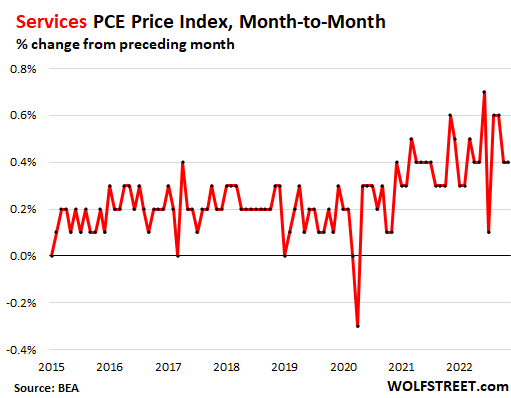
On a year-over-year basis, the PCE Price Index for services rose 5.2%. It has now been above 5% for the fourth month in a row, and is not showing any signs of a substantive decline. This is very discouraging – and source of the frustration that Powell recently expressed:
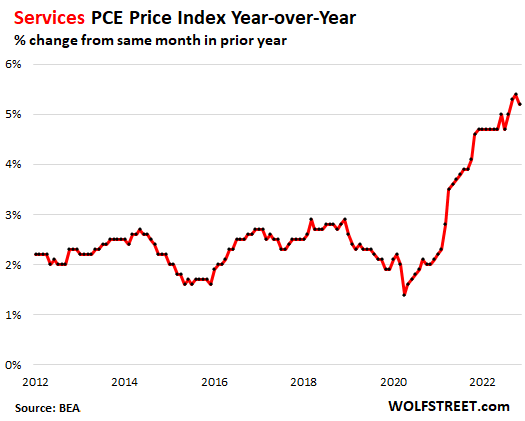
But the PCE price index for durable goods – new and used vehicles, appliances, furniture, etc. – is definitely showing a downtrend, and has turned negative on a month-to-month basis for the second month in a row. In November, it dropped by 0.8% from October, the biggest month-to-month drop in years:
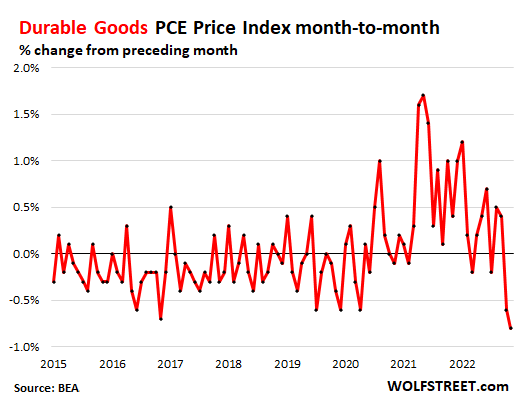
These month-to-month declines whittled down the year-over-year increase of the PCE price index for durable goods to just 2.8%, the lowest since March 2021:
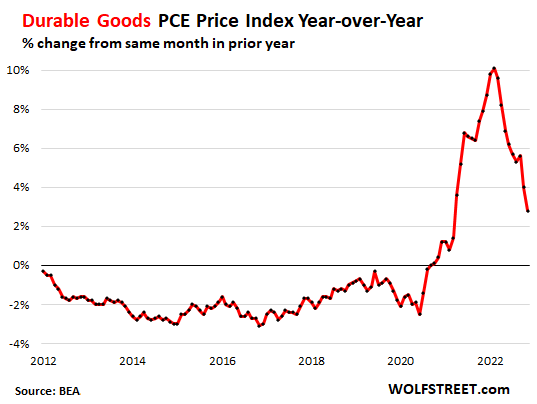
The PCE price index for nondurable goods also declined month to month (-0.1%); and the index for all goods declined month-to-month (-0.4%).
Those charts above show what is going on with inflation: Goods inflation is coming down, but services inflation is high and not improving.
Head-fakes galore.
The Core PCE price index for goods and services, on a month-to-month basis, has served up a number of head-fakes since early 2021, as month-to-month inflation indices do. It gets worse for a few months, and then it gets better for a few months and then it gets worse again. This is a fear and frustration that Powell also expressed in his speech a month ago, when he said that “down months in the data have often been followed by renewed increases.”
So in November, it got better for the third month in a row, rising 0.2%, which seems to be encouraging. But just looking at the chart, I fear that the next leg up may be coming soon:
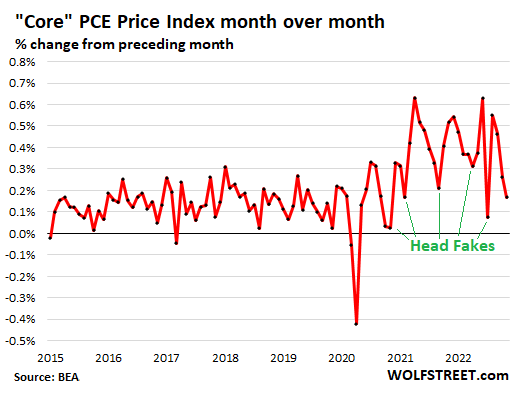
On a year-over-year basis, the core PCE price index rose 4.7%, same as in July. This would be mildly encouraging, but it was driven by the improvement in the goods-based indices (thank you!), while services inflation, where inflation matters the most because that’s where people do most of their spending, continues to rage:
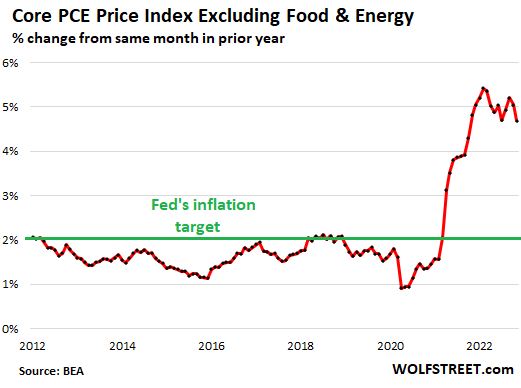
Enjoy reading WOLF STREET and want to support it? You can donate. I appreciate it immensely. Click on the mug to find out how:
![]()


Keep in mind the Fed changed to an average of 2%, and said that inflation may need to run over to make up for past low inflation.
They didn’t say if that was a 2 year or 5 year average, so it still could be a case of monetary Calvinball.
Whatever the timespan, I wonder if they’ll allow inflation to run under 2% to make up for past high inflation.
When did we really see deflation? Before minimum wages and before financialization of real estate and before existence of bailouts.
Today businesses will prefer to trash merchandise than lower price due to high cost of labor (in US) and high rents.
Hence we may have lots of dollars, but still find it hard to buy kids fever medicine.
Some shortages are positives, and I can’t think of a better one.
OTC is a WASTELAND, and likely plays a BIG part in “auto-immune” disease. Maybe more than the human CMAH gene mod, although there is no way to quantify it and everyone is different.
But the sooner people are sick of “magic bullets” the better.
It’s a toss up as to who I’d like to dig up, revive, and torture more, Erlich or Reagan.
Should have said “tired of” rather than “sick of”….too many are already sick from them.
NBay – agree, but not overly optimistic when I consider the age and endurance of the children’s tale of ‘Jack and the Beanstalk’, and it’s not-cautionary-enough ending.
Still shake my head over the number of amateur moto racers who would drop by our pit wanting to know what individual setting/part we were using, convinced there was ‘magic’ therein when the cold reality was that solid racing success has always been grounded in test/analyze/adjust/retest/analyze/adjust/race and do your best to ensure your bike development meshes with an equal commitment in the ongoing development of the rider (only Stoner, for example, could come to terms with the MotoGP Ducati of his day where even the great Rossi couldn’t…). (One bright spark appeared to get a half a clue and stole my crew chief’s setup notebook out of our pit at the conclusion of the ’04 AFM season, though…).
Perhaps ‘magic’ is no more than the eternal human wish for luck to appear on-demand at a certain moment…
may we all find a better day.
Like that last sentence. And the trial and error promoting.
And I think the perks (and much much later much money, too) for “delivering” said luck to the “uninformed” (by preachers and doctors, who were probably the same guy originally) represent even older professions than prostitution, contrary to that common old saying….but I could be wrong, knowing how human males are. But ya still had to have a preacher to say “stone her”, speaking (as always) on behalf of the what the universe wants.
Why is the services index inflation stickier than durables? Is it because the services inputs are “soft” and harder to value — so that once prices go up, those who set the prices are loathe to lower them?
If service inflation isn’t *always* stickier than durables, is it a side effect of the tight jobs market?
(These are honest questions — not trying to set up a straw man, just trying to understand!)
“Why is the services index inflation stickier than durables?”
Yes, this is a key question. And Powell addressed it specifically.
Labor costs are surging, and they’re the biggest cost factor in non-housing services. Powell pointed this out. And he said that this surge in labor costs needs to cool down for services inflation to cool down. That’s why he is talking a lot about the labor market.
He went through this in detail a month ago in his big speech:
https://wolfstreet.com/2022/11/30/these-crazy-rallies-on-hawkish-fed-plans-are-good-because-crashing-stocks-seizing-credit-markets-would-cause-the-fed-to-wobble-in-its-inflation-crackdown/
Demand for services is very strong, outpacing with ease the price increases. I’ll have an article on that in a minute.
I boils down to this: you have input costs of service providers shooting higher because of labor costs; and on the other hand, you have strong demand for these services. And so the cost increases can be passed on to the consumer: and we get services inflation.
The strong demand for services also increases the demand for labor to perform those services. And so service providers have to pay more to attract service workers, and their costs go up, and they can pass them on, and services inflation spirals higher…
“Demand for services is very strong, outpacing with ease the price increases. I’ll have an article on that in a minute.”
This is it in a nutshell. They printed too much and overheated the economy. You can’t take it back. Now it has to run its course.
My boots on the ground assessment is that we are nowhere near a recession. I have seen no slowdown in anything, anywhere.
What us Government Services growth, monthly and annually ?
Some grow, some same, some shrink, some gutted. Best to ask a lobbyist with a LOT corp and/or PE money behind him. They are the ones who primarily decide such matters.
Goods can inflate and deflate, but the costs of services, particularly labor, rarely if ever decrease. Labor may end (cutbacks, business insolvency) but hourly wages and most salaries almost never decrease.
You must not remember the last 2 bubbles imploding. Tech salaries went down after 2000-1, and far fewer kids studied comp sci as a result. And after the GFC/housing bubble 1.0, tradesmen were desperate for work. Same thing will happen this time for both groups since this is the everything bubble.
I’m in tech and the list of companies in the space with train wrecks for financials guarantees many many layoffs. Some spend more on marketing than they take in as revenues!
Layoffs, yes. But during restructuring, it’s very rare for employees to take salary reductions in lieu of severance or the dismissal of other employees. Lots of that in aerospace in the ’60s.
I was told (probably just a joke) that a survey was sent out to an engineering group (a large defense contractor) asking each one whether they’d work extra hours for the same salary. And the ones who said they would were laid-off – as in, they were too stupid to be kept.
A friend of ours who used to work at a low end tech job had to swallow a 20% pay cut back in 09….got laid off altogether a couple of years ago
Non sense, at least in the mkts I have worked in for the last 60 years or so HN:
Wages in CA were, at top of the line, $5 per hour in 1966-1970 just exactly because of the recent crashes.
After that, wages were up and down several times.
Similarly in FL from early ’60s until at least late ’70s, and especially recently compared with the last ”crash” and recovery.
Wages, and almost every other ”cost of construction”,, including especially commodities such as rebar, lumber, red iron, concrete, do go up and down, with some outliers in each and every case depending on the local situation…
((( Was estimating many millions of projects each year, until a 4BB Nasa project in my last couple of years broke that barrier.)))
Why Powell didn’t blame executive bonuses and salary increments.
Corruption is so visible in corporate America that many executives are expanding headcount for empire building and getting promoted (based on headcounts) with no regard to profitability. Intact efficient solutions are being discarded for inefficient solutions as the latter allow expanding headcounts!
He’s hitting tech executive compensation just fine by letting the hot air out of tech stocks. That has a huge impact on bonuses and stock options where the upper tech echelons make most or nearly all of their money.
Given the chance, ANY “manager” will do that, one plus step above, or even actual first line supervisor level.
That’s been my job experience, anyway. Maybe 3/5 in private, the rest in Gov’t.
That’s why I dislike them ALL from the start, except for a VERY few who were actually interested in the job (mission) and not just making more money……and most of those were Engineers.
To me, the JOB was the ultimate authority, so I pissed off a lot of them who thought one’s POSITION was.
Respect has to be EARNED.
According to Elenor Rosenthal (sp?) of Kaiser Health News (no, not the damned HMO, a fund set up by the Kaiser STEEL family which I HIGHLY recommend checking out from time to time), if single payer health care were adopted (Medicare expansion) rather than the ACA, well over 2 million insurance employees would lose their job. So that’s one against the Democratic National Corporation. BUT, still not NEARLY as damaging as fossil fuel/chemical industry is to future humans…and is CORRECTABLE by them, unlike the other, if they even still can.
Services are sticky because people resist lower wages, and/or fight for higher wages when all around them are getting or got increases. Management can only do so much, short of firings and rehirings at lower wages. Goods, on the other hand, sit silently, and obey whatever price the seller decides to put on them.
Transitory inflation talk is back. But economists say higher prices are here to stay. Now we have a group saying no that airlines are the next boom stocks, while they barely have enough employees to operate 50% of the time. You have have employees to run a business, hotels and restaurants are in demand but will never capture margins.
Not sure how prices of anything can go down when you still have a strong labor market. Per the last article consumers are still in excellent shape. Unless supply chain issues are fixed and goods become more plentiful I don’t see prices coming down any time soon.
“This is very discouraging – and source of the frustration that Powell recently expressed”
Why did you print all that money, then?
Unprint it now!
And they’re doing it, at a measured pace… called QT
I’m starting to like the term “unprinting money.” It’s like the NAR’s “negative price growth” LOL
QT is transitory, and the damage done in the interim could be permanent. Well done FED, as in, we are thoroughly cooked!
“So in November, it got better for the third month in a row, rising 0.2%, which seems to be encouraging. But just looking at the chart, I fear that the next leg up may be coming soon”
Never would have taken you for a technical analyst, Wolf. I figured that’s Michael Engel’s world.
;-)
Wolf – along with the evergreen(?) ‘creative destruction’…
may we all find a better day.
As an arsonist, one thing I really hate is when I set a fire and spend years pouring tanker after tanker of gasoline on that fire as it spreads, only to find the fire curiously difficult to put out when I grow tired of it.
Wolf
FYI: Cost of energy in NW Colorado
Good News: Gasoline prices are down to ~ $2.70 – 2.80 a gallon
Bad News: Utility Bills are up ~ 46% since Biden took office.
Our Average monthly bill (electric & natural gas) is up ~ $86.00
Yearly increase ~ $1,000.00
Electric utility company is asking for a 8.20% rate increase for average residential customers in 2023.
I know the cost of energy is not part of the CPI, but it does affect the cost of living. I don’t see inflation getting under control anytime soon. Sure glad we saved our money before we retired.
Long term CD rates have plummeted, long term bond yields are way down. The stock market is on a downward spiral.
Serious question- what does a saver do with his cash right now?? Let it sit and earn 4% in a high yield savings/ Money market account?
I’m not sure I understand what you’re talking about, in terms of yields “plummeting.” The 10-year Treasury yield has risen all week and today hit 3.75%, up by 30 basis points from a week ago. American Express Personal Savings account raised its interest rate to 3.3% yesterday, up from 3.0%. I’ve seen 1-year CD rates of 4.8%.
In terms of your question: If you’re saver, you’re in better shape now than a year ago. If you’re an investor in stocks, cryptos, etc. you’re in worse shape than a year ago.
I just bought a 9 month CD from my credit union for 4%. When my other CD matures, paying 1.75% now, I’ll roll that over into another 4% CD. I don’t know about you but I’m happy to sit back and collect 4% now and maybe 5% next year and sleep well at night. Interest rates are going nowhere but up. You can’t lose.
I also have a variety of CDs/bonds with laddered maturities out to 2 years, and agree “you can’t lose” – except to inflation, or to whatever the hot thing is next year, if you lock up your money for too long.
If we get a rollercoaster like the 1970s, need to stay nimble to not miss the opportunities.
Inflation in RE has topped out. We did a small Condo that was listed at $375 and just sold for $325. Only small pockets are holding up in price. Most properties are down 10% or more. That 4% return on my CD is looking better and better every day.
J Powell is doing “One heck of a job”. I hope he keeps pushing up the interest rates until he’s broken the back of inflation. Paul Volcker would be proud.
It is better to get O% interest with 2% inflation, than 4% with 7 inflation.
Just opened an online high yield savings account at my normal bank, PNC, with 4.0% APY. Feels great to finally earn some interest from the bank again. :)
In addition to PCE, another yardstick to pay attention to is near-term forward spread, which indicates exactly what Powell has been saying for months. The Fed will raise terminal rate above 5%, by sometime before mid 2023, and then rates will stay elevated. That treasury-based market realty seems lost on people who are dreaming up theories about early pivots.
1) Do gun shot wounds contribute the PCE : they keep ER open, police detective searching, the media reporting and the prison system.
2) Are women for whom marriage is a form of slavery contribute to the GDP. Their growth is measured differently. They might become grandmas in their late 30’s, great grandmas in the late 50’s. In their 70’s their family tree grow exponential. They keep the doctors running, consume Pepsi and Walmart, playing games…
3) The boys will work hard to become Michael Jordan, NBA/ NFL players, or a president. Nothing else is good enough to extract them.
4) A decade of inflation above Fedrates to deflate gov debt, will reduce their entitlements and delusions. One day they will face reality, work for an immigrant who opened a business, not a slaves owner who must apologize to them.
What
Sounds to me like our chartist is considering wearing a sheet?….I think most of them can usually afford a suit and tie….but lot’s of people are falling on hard times nowadays……
PCI-U is around 7% and near-term forward spread is under 5% but raising terminal towards 5.25% and being patient is going to take time. Recession dynamics will be slow too, as GDP declines with everything else. This will be glacially slow, no need to stay glued to real-time nano noise.
My bottom line: Nominal Interest rates should be in the double digits. Inflation is eating away at the value of our money. Real rates are negative big time.
Cheers,
B
Raising interest rates quickly to double digits in the 1980’s caused a severe but short recession. I believe the slow raising of rates now is going to cause a progressive, but eventually severe, and much longer recession.
People I respect say what you say.
I respect Wolf, what does he say?
I’m OK with the current pace. There is enough upheaval in the markets already. Markets need time to adjust to a new reality. Eventually they’ll get there.
I think the upper end of the FFR at 6%, if inflation stays roughly where it is today, would be a good place by mid-year. And then wait and see, to let those higher rates do their thing.
In terms of QT: The HUGE QE we got did a lot of damage. Going at the same speed into the opposite direction might create the opposite kind of damage of the same magnitude, which may be just as bad or worse, and then they’ll start the whole QE shitshow again.
The combination of rate hikes and QT is pretty powerful in terms of letting out the hot air of the markets. I don’t want markets to implode all in one week because it will freeze up the economy; but the economy will be just fine if markets take three years to do the same thing.
Was there and you are correct again Jpup:
Also want to encourage the FRB to have the courage to do what SO clearly needs to be done, per 1980s quick and over ”depression” or recession, or correction, or, ”WHATEVER.”
All these and other machinations by the FRB and for that matter ALL the CBs around are nothing more than moves to HELP THE OLIGARCHY.
Don’t really know how long it will take for WE the PEEDONs to actually ” REAL EYES” how much each and every ”degradation of money” hurts WE PEEDONs who actually DO MAKE REAL STUFF….
As opposed to the oligarchs and their paid puppets in political positions,,, as well as their now very well puppets in positions in oligarch owned ”corporations.’
That was because people didn’t plan ahead. The average nine-to-fiver only lives one day at a time and whatever happens in the future happens. It’s still the same today as it was back then.
Maybe he wasn’t trapped in it (or even around) for 4+ years like I was. No fun! And it WAS NOT SHORT! Many never got out…..I was one of the lucky ones.
I wonder how the ‘soon to be finished’ withdraws from national petroleum reserve will affect future goods and services inflation. Are energy prices about to shoot up?
Gold for oil sounds good to me. A lot of gold for a miniscule amount of oil is what Putin wants.
Laws could be passed to tax vacant housing (including rentals) to bring down inflation related to housing. Californian cities and Canada are currently looking at this. It fixes a lot of problems having to do with hoarding of housing. There are many places in this country with over 10% vacancy rates.
Hopefully all the pandemic “get rich quick” Airbnb’s will be sold soon!!! A brief slowdown in the US would flush a lot of owners out.
I floated this idea on this board a while ago, I think it would be great. Rent-seekers need to be taxed aggressively to hit them where it hurts.
End all income tax deductions for vacant homes too. If you own a rental SFH or Multi-Family, get some butts in there (i.e. lower your prices) or you don’t get any tax deductions for the time it is vacant.
This would never get through the 535+1 disgusting cockroaches in DC, so it’s more of the musings of a lunatic who wishes there was still hope.
Multi family needs more leniency than single family. Every citizen in the country needs to build a home for themselves, but there need to be investment incentives to build apartment complexes. There should be no investment incentives whatsoever on holding single family residences as the best way possible to guarantee the everyone can buy as affordable place to live. We’ve given nothing but carrots to investors for stripping single family residences away from families. Now we need to bring out the sticks.
Canada already has an empty home tax and it goes up to 5 percent from 3 percent in Vancouver in 2023. It hits the Toronto market in 2023 at 1 percent of the assessed value of the home. It’s of course directly aimed at the Chinese both local and foreign. Halifax is also bringing in a tax for people buying out of province who don’t live in Halifax. None of the money in Halifax is Chinese money.
The bureaucracy needed to police vacant rentals. Yikes. Seems like the taxes they would charge would not be enough to cover the cost of the enforcement of the program.
The cost of enforcement? A letter in the mail saying you owe 5% a year on your home? Doesn’t sound like a high cost to me. There are enough ring cameras installed around the country that A.I. algorithms could do the monitoring with no need for human labor. Most homeowners would be glad to share their ring camera data because vacant homes in neighborhoods bring down property values.
On Marketwatch this morning: “10 ways American finances actually improved in 2022.”
Propaganda makes me sick.
Goods fell in price because it was the end of year sale where they have to unload the remaining stock and 2022 model cars and trucks to make room for the new stock in 2023 and new 2023 cars and trucks. That was one of the reasons for some of the price cuts. Now they can raise prices again as the new stock hits the shelves in 2023 and the 2023 model cars and trucks hit the lots.
All data here is “seasonally adjusted.” So any regular seasonal price movements have been adjusted out of the data.